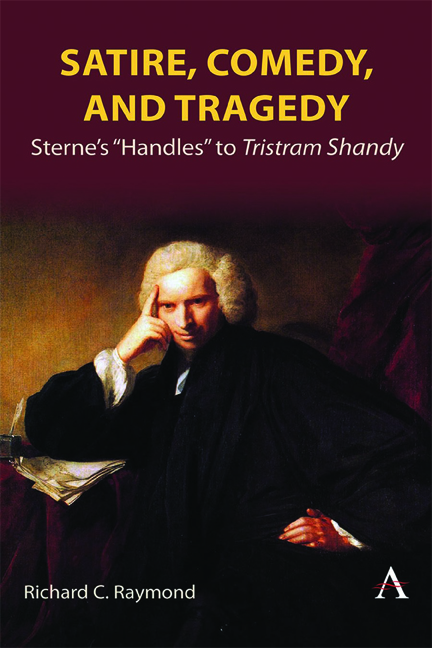Book contents
- Frontmatter
- Contents
- Preface
- 1 Walter, Toby, Tristram, and the Reader: Sterne’s Revision of “Dullness”
- 2 The Yorick Standard, Walter’s Benevolent Dullness, and Tristram’s Friends: The Plot of Satire in Tristram Shandy
- 3 “True Shandeism”: The Unhappy Comic Action in Tristram Shandy
- 4 Isolation and Death: The Tragic Undertones of Shandean Benevolent Dullness
- 5 Benevolent Dullness, Ambiguity, and the Reader: Modal Complexity and the Plots of Tristram Shandy
- 6 Laurence Sterne’s Letters
- 7 The Shandean Sermons of Parson Sterne
- 8 Parson Yorick in A Sentimental Journey and in A Continuation of Bramine’s Journal
- 9 The International Perspective on Tristram Shandy and the Argument
- References
- Index
9 - The International Perspective on Tristram Shandy and the Argument
Published online by Cambridge University Press: 01 March 2024
- Frontmatter
- Contents
- Preface
- 1 Walter, Toby, Tristram, and the Reader: Sterne’s Revision of “Dullness”
- 2 The Yorick Standard, Walter’s Benevolent Dullness, and Tristram’s Friends: The Plot of Satire in Tristram Shandy
- 3 “True Shandeism”: The Unhappy Comic Action in Tristram Shandy
- 4 Isolation and Death: The Tragic Undertones of Shandean Benevolent Dullness
- 5 Benevolent Dullness, Ambiguity, and the Reader: Modal Complexity and the Plots of Tristram Shandy
- 6 Laurence Sterne’s Letters
- 7 The Shandean Sermons of Parson Sterne
- 8 Parson Yorick in A Sentimental Journey and in A Continuation of Bramine’s Journal
- 9 The International Perspective on Tristram Shandy and the Argument
- References
- Index
Summary
We have discovered in Chapters 1 through 5 that in drawing his Shandean characters, Sterne's revision of dullness fuses benevolent intentions with self-defeating actions. We have found, too, that this paradoxical blend of self-sacrifice and self-inflation draws us within the Shandean world to admire their generosity and to laugh at their ineptness. Within the ambiguity of that world, we have also learned that while the benevolence of Yorick seems nearly unachievable, the life of utter dullness seems nearly unforgivable. Not surprisingly, as Mary-Celine Newbauld has thoroughly documented, such keen Sternean insights to the ambiguity of the human condition profoundly influenced other creative works in eighteenth-century Britain, including sentimental travel narratives, theater, and graphic arts.
The International Inf luence of Tristram Shandy and Sterne's International Inf luencers
In reading responses to Sterne's Tristram Shandy beyond England, we learn that Sterne's revision of dullness has been the primary cause of his work's popularity and influence. Lodwick Hartley writes, for instance, that Tristram Shandy enjoyed popularity with eighteenth-century American statesmen. While Thomas Jefferson admired Sterne's moral “emphasis on inward motive and intention,” Aaron Burr, thinking of forgivable, well-intended Shandean dullness, admitted that “if I had read Sterne more and Voltaire less, I should have known that the world was wide enough for Hamilton and me.” After outlining the many inept, eighteenth-century American imitations of Sterne's sentiment Hartley explains that twentieth-century Americans have appreciated Sterne for his Joycean treatment of “human isolation in a world where everybody is victimized by the limitations of language and by his own peculiar ‘association of ideas’ “ (Hartley 1971, 167). Yet American readers still value Sterne, says Hartley, as a “prophet of men of good will” (Hartley 1971, 168).
Sterne's revision of dullness has also strongly influenced non-English-speaking writers and readers. As A. O. Aldridge explains, Brazil's Machado de Assis reveals a “peevish pessimism” over worldly dullness that makes his tone more sardonic than Sterne’s. But Aldridge also notes that Machado de Assis revealed Sterne's influence by using the digressive technique to involve readers in the creative process of exposing hobbyhorsical dullness (Aldridge 1971, 170–75).
- Type
- Chapter
- Information
- Satire, Comedy and TragedySterne's 'Handles' to <i>Tristram Shandy</i>, pp. 141 - 156Publisher: Anthem PressPrint publication year: 2023



